| 2 February |
• yesterday • tomorrow |
| Feast of the Presentation of the Lord |
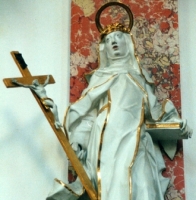
• Catherine de Ricci
• Catherine dei Ricci
• Caterina, Catharine
Born to the patrician class. Her mother died when Catherine was an infant; she was raised by her godmother, but considered the Blessed Virgin Mary to be her true mother, and developed a great devotion to her. As a child, Catherine could speak to her guardian angel, and the angel taught her prayers for the rosary. At age 6 she moved to the convent school of Montecelli; her aunt was the abbess. Catherine developed a devotion to the Passion. Her father, Peter, objected to her plans to join a convent, then relented, then changed his mind again. Catherine continued her prayers at home, but when he changed his mind she fell ill. It was only when he at last agreed on her vocation that she recovered. Dominican tertiary.
She received visions and had ecstacies, but these caused some problems and doubts among her sisters – outwardly she seemed asleep or dully stupid when the visions were upon her. Catherine though everyone received these visions as part of their lives with God. She was stricken with a series of painful ailments that permanently damaged her health. Catherine met Philip Neri in a vision while he was alive in Rome; they corresponded. She could bilocate. Said to have received a ring from the Lord as a sign of her espousal to him; to her it appeared as gold set with a diamond; everyone else saw a red lozenge and a circlet around her finger.
Permanent stigmatist. At age 20 she began a 12-year cycle of weekly ecstasies of the Passion from noon Thursday until 4:00pm Friday, often accompanied by serious wounds. Her sisters could follow the course of the Passion, as the wounds appeared in order from the scourging and crowning with thorns. At the end she was covered with wounds and her shoulder was indented from the Cross. The first time, during Lent 1542, she meditated so completely on the crucifixion of Jesus that she became ill, and was healed by a vision of the Risen Lord talking with Mary Magdalene. Crowds came to see her, skeptics and sinners being converted by the sight. The crowds became to numerous and constant that the sisters prayed that the wounds become less visible; He made them so in 1554. Three future popes (Cardinals Cervini, Pope Marcellus II; Alexander de Medici, Pope Leo XI; Aldobrandini, Pope Clement VIII) were among the thousands who sought her prayers.
Novice-mistress. Sub-prioress. Prioress at age 30. Noted reformer of her house. Correspondent with Saint Charles Borromeo and Pope Saint Pius V.
23 April 1522 at Florence, Italy as Alessandra Lucrezia Romola de' Ricci
2 February 1590 at Prato, Italy of natural causes
29 June 1746 by Pope Benedict XIV
• against illness • sick people • pipe makers • tobacconists • Prato, Italy
• ring • crown • crucifix
https://catholicsaints.info/saint-catherine-del-ricci/
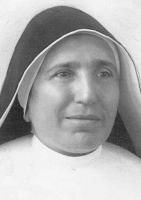
Mother Maria of the Immaculate
Eldest of four children born to Giovanni and Prudenza Zamperini, Maria grew up in a small farm village She received only three years of elementary school, learned religion from her pious parents, and was early drawn to religious life. In her teens, Maria's parish priest and spiritual director, Blessed Giuseppe Nascimbeni, encouraged her to visit the sick, teach catechism, and become active in her parish work.
On 8 December 1886, Maria made a private vow of virginity, and asked for Our Lady's guidance in how best fulfill her religious vocation. In 1892, Maria and Father Nascimbeni founded the Congregation of the Little Sisters of the Holy Family with four women; Maria took the name Mother Maria of the Immaculate, but everyone simply called her Mother. Their mission was to promote parish life and help the spiritual and material well-being of people in need, and Maria served as first Superior General, guiding the Congregation for the next 40 years. She was known for the depth and intensity of her prayer life, her devotion to Our Lady, and her gentle spiritual guidance to her sisters and the townspeople alike. Today the Little Sisters of the Holy Family work in Italy, Switzerland, Albania, Africa, Argentina, Brazil, Uruguay, and Paraguay, serving children and youth, families, priests, the elderly and the disabled in parishes.
12 November 1862 in Castelletto di Brenzone, Italy
2 February 1934 in Castelletto di Brenzone, Italy of natural causes
• 27 April 2003 by Pope John Paul II
• the beatification miracle involved the 6 March 1999 healing of a one-day-old girl in Bahía Blanca, Argentina who fell from her hospital bed and received a head injury resulting in severe brain damage and a coma
• 15 May 2022 by Pope Francis
• the canonization miracle involved the healing of an 11 year old girl of "epileptic state of illness; coma; cardio-respiratory arrest; acute respiratory failure; infections in patient with myelomenigocele and derived hydrocephalus, lower limb paraplegia" in 2011 in Bahía Blanca, Argentina
The Holy Family, for the great and mysterious project [that God is calling it to], has chosen me as its Cofoundress, knowing that the Lord uses the least qualified, little, unknown instruments to do great works. I am tranquil and convinced that the Institute, the work of God, will be provided for and guided by Him. – Blessed Maria
This praiseworthy daughter of the region of Verona, a disciple of Blessed Giuseppe Nascimbeni, was inspired by the Holy Family of Nazareth to make herself "all things to all people", ever attentive to the needs of the "poor people". She was extraordinarily faithful, in all circmstances and to her last breath, to the will of God, by whom she felt loved and called. What a fine example of holiness for every believer! – Pope John Paul II, from his homily during the beatfication of Blessed Maria
https://catholicsaints.info/saint-maria-domenica-mantovani/
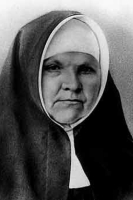
• Catalina Kasper
• Catherine Kasper
• Maria Caterina Kasper
Third of four children born to Heinrich Kasper and Katharina Fassel, poor but devout peasants; she had four half-sisters from her father's first marriage. A happy, out-going child, Maria was an avid reader with a fondness for both the Bible and The Imitation of Christ by Thomas a Kempis. Health problems often kept her home from school, but there she learned to spin and weave. She worked with her parents in the fields, and when she could do it, earned extra money by breaking stones for road construction.
Maria she felt an early call to religious life, and would lead pilgrimages of other children to local Marian shrines. However, her father died when she was 21, one of her brothers when she was 22, and the family was left so poor that Maria had to stay to help them survive by selling her weaving. When her mother died, Maria felt she could finally follow her vocation, and with the approval of the bishop of Limburg, Germany, she started a small house with several friends who also felt the call. They became a formal association in 1845, and on 15 August 1851 they were established as the Poor Handmaids of Jesus Christ, a congregation dedicated to caring for the poor. Maria served as superior for five consecutive terms. The Handmaids opened their first school in 1854, spread to the Netherlands in 1859, received a decree of praise from Pope Pius IX on 9 March 1860, and formal approval by Pope Leo XIII on 21 May 1890. Her order continues its good work today with 690 sisters in 104 houses in Germany, the Netherlands, the United States, Mexico and India.
26 May 1820 in Dernbach, Westerwaldkreis, Germany
• 2 February 1898 in Dernbach, Westerwaldkreis, Germany of complications following a heart attack on 27 January 1898
• re-interred at the chapel of the motherhouse of the Poor Handmaids of Jesus Christ in 1950
• 16 April 1978 by Pope Paul VI in Saint Peter's Square, Vatican City, Rome, Italy
• the beatification miracle involved the instantaneous cure of Sister Mary Herluka, a member of the Poor Handmaids of Jesus Christ, of severe tuberculosis in September 1945
• 14 October 2018 by Pope Francis at Saint Peter's Basilica, Rome, Italy
• the canonization miracle took place in India in 2012
Poor Handmaids of Jesus Christ
https://catholicsaints.info/saint-maria-katharina-kasper/
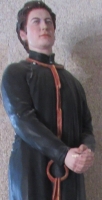
24 November as one of the Martyrs of Vietnam
Raised in a pious family; one brother became a priest, and was later curator for Theophane's writings, and another was the bishop of Poitiers, France. Studied at the College of Doue-la-Fontaine, Montmorillon, Poitiers, and the Paris Seminary for Foreign Missions. Ordained on 5 June 1852. Missionary to southeast Asia, leaving on 19 September 1852. Worked fifteen months at Hong Kong, then transferred to West Tonkin (in modern Vietnam).
Christians in the area were being persecuted by order of the ruler Minh-Menh. Just before Theophan's arrival, new anti–Christian orders had forced priests and bishops to go into hiding in forests and caves. Father Vénard, whose health had never been good, suffered terribly, ministering to his flock by night and, when he could find a secure location, by day for nearly four years. Betrayed by an ostensible parishioner, he was arrested on 30 November 1860. He was tried for the crime of being Christian, and was given ample opportunity to save himself by denying Christ; he declined. He was kept in a cage for several weeks prior to his execution, during which he wrote a series of joyful, consoling letters to his family. One of the Martyrs of Vietnam.
21 November 1829 at Saint-Loup, diocese of Poitiers, France
• beheaded on 2 February 1861 at Ô Cau Giay, Hanoi, Tonkin (in modern Vietnam)
• his head was stuck on a pole as a warning to others, but was later recovered and preserved as a relic in Tonkin
• the rest of his body was sent back to his family, and is interred in the crypt of the Missions Etrangères in Paris, France
19 June 1988 by Pope John Paul II
A slight sabre-cut will separate my head from my body, like the spring flower which the Master of the garden gathers for His pleasure. We are all flowers planted on this earth, which God plucks in His own good time: some a little sooner, some a little later. Father and son may we meet in Paradise. I, poor little moth, go first. Adieu. – Saint Theophane in a letter to his father just before his martyrdom
https://catholicsaints.info/saint-jean-theophane-venard/
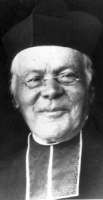
Alois Brisson
The only child of Toussaint and Savine Brisson. Educated by a local priest who had a large library; Louis read everything, but was especially interested in science. Seminarian in Troyes, France. Ordained on 19 December 1840. Teacher at the Visitation school in Troyes. Chaplain to the Visitation Sisters in Troyes. Confessor, spiritual director and eventual biographer of Mother Marie Therese de Sales Chappuis, superior of the Visitation house. With her help, and that of Saint Francisca Salesia, he founded the Oblate Sisters of Saint Francis de Sales in 1859 to minister to girls working in textile factories. Established Saint Bernard's College in Troyes in 1869. On 27 August 1876, Louis and five other priests formed the Oblates of Saint Francis de Sales. Late in his life, the French government closed all religious houses, and the Oblates transferred their General House to Rome, Italy; being too elderly and frail to travel so far, Father Louis saw them off and then retired to spend his remaining days at his family home in Plancy, France.
23 June 1817 in Plancy-l'Abbaye, Aube, France
2 February 1908 in Plancy-l'Abbaye, Aube, France
22 September 2012 by Pope Benedict XVI
Lord, please visit and protect the family of the Oblate Sisters and of the Oblates of Saint Francis de Sales, which is the vine your powerful hand has planted through the work of your servant, Louis Brisson, OSFS. For the glory of your Name, make this family grow in your love, and grant to it, for the joy of the whole Church, the recognition of the untiring zeal of its Founder for the Gospel and of his heroic courage in the midst of trials. We ask through through our Lord Jesus Christ, your Son, who lives and reigns with you and the Holy Spirit, one God forever and ever. Amen. – Prayer for the Beatification of Father Louis Brisson, OSFS
Hold the child in high esteem and instead of frustrating, lend a hand to the work grace accomplishes in these young souls. – Blessed Louis to the members of the Oblates of Saint Francis
http://catholicsaints.info/blessed-louis-alexander-alphonse-brisson/
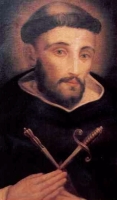
• Peter de Ruffi
• Peter of Ruffia
• Peter Cambiani
• Peter Cambiano av Ruffi
7 November (Dominicans)
Peter's father was a city councillor, his mother was from a noble family, and the boy was raised in a pious household. He received a good education, and was early drawn to religious life, with a personal devotion to Our Lady of the Rosary. Joined the Dominicans in Piedmont, Italy at age 16. He continued his studies, and was ordained at age 25. Noted preacher throughout northern Italy. He worked to bring the heretical Waldensians back to the Church. Appointed inquisitor-general of the Piedmont.
In January 1365 Peter and two Dominican brothers went on a preaching mission through the mountains between Italy and Switzerland, working from the Franciscan friary at Susa, Italy. Peter's preaching brought many back to the faith, which earned him the anger of the Waldensians. Three of the heretics came to the friary, asked to see Peter, and then murdered him at the gate. Martyr.
1320 in Chieri, Piedmont, Italy
• stabbed to death with daggers on 2 February 1365 by Waldensian heretics outside the Franciscan friary of Susa, Italy
• buried at the Franciscan house as it was considered unsafe to transport his body through the hostile heretical territory
• relics translated to the Dominican house in Turin, Italy in 1517 after the friary was destroyed by an invading army
4 December 1856 by Pope Pius IX (cultus confirmation)
• Dominican with one or more daggers
• Dominican with a palm of martyrdom
Loving God, in your mercy you bestowed the crown of martyrdom on Blessed Peter for his defense of the true faith. Help us by his prayers to please you by a faith that is manifested through charity. We ask this through our Lord Jesus Christ, your Son, who lives and reigns with you and the Holy Spirit, one God, for ever and ever. – General Calendar of the Order of Preachers
https://catholicsaints.info/blessed-peter-cambiano/
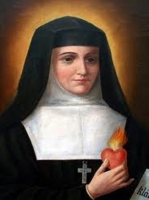
• Jane de Lestonnac
• Joan de Lestonnac
Married Gaston de Montferrant, Baron of Landiras, in 1572 at age 16. Mother of seven, five of whom lived to adulthood; two of the five entered religious life. Widowed at age 41, she ran the affairs of her estate and castle by herself.
Believing that her obligations to the world were finished, she entered a Cistercian house at Toulouse, France at age 46. She was not up to the rigors of the order's discipline, became seriously ill, and wanted to die at the monastery; her superiors refused to allow it. On her last night at the monastery, she had a vision of Mary who presented an image of Jeanne helping lost children.
Returning to her estate, she slowly started this work with local women and priests which led to the foundation of the Sisters of the Company of Mary, devoted to the education of girls and slowing Calvinism. It was approved by Pope Paul V on 7 April 1607; Joan was elected superior in 1610. Today the congregation has grown to 2,500 sisters in 17 countries.
27 December 1556 at Bourdeaux, France
2 February 1640 of natural causes
15 May 1949 by Pope Pius XII
• abuse victims • people rejected by religious orders • widows •
https://catholicsaints.info/saint-jeanne-de-lestonnac/
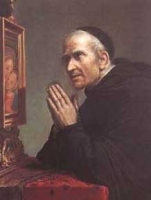
• Aloysius Bellesini
• Stefano Bellesini
3 February (Augustinians)
Born to the Italian nobility. Became Augustinian in 1790 at age 16 at the monastery of Saint Mark in Venice, Italy, taking the name Stephen; he made his profession on 31 May 1794. Studied in Rome and Bologna in Italy. During the French Revolution troops shut down religious houses in the region, and dissolved the Augustinians; this ended Stephen's studies, and left him without his religious community.
He devoted himself to preaching and religious education for children. He organized a free school for poor children at Trentino. It was called La Scola per gnent (The School for Nothing), and had nearly 500 students and several lay teachers. His work impressed the governors of Trent, Italy, and they appointed him inspector of the province's schools.
When the Augustinians were restored, Stephen return to religious life. Novice master at Rome and Citta delle Pieve, Italy. Parish priest in 1831 at Genazzano, Italy, site of the shrine of Our Lady of Good Counsel. Devoted to his parishioners, Stephen made endless sick calls, working with victims of a cholera epidemic in 1840 until contracting the disease himself.
25 November 1774 at Trent, Italy as Aloysius Bellesini
2 February 1840 of cholera and an infection that developed from a cut on his leg received by an accidental fall while visiting the sick at Genazzano, Italy
27 December 1904 by Pope Pius X
https://catholicsaints.info/blessed-stephen-bellesini/
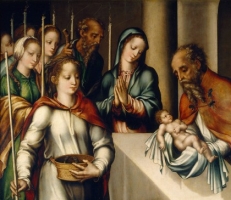
• Our Lady of the Candles
• Presentation of the Infant Jesus in the Temple
• Presentation of the Lord
• Purification of the Blessed Virgin
• Candelas (Spanish)
• Candelora (Italian)
• Chandeleur (French)
• Hromnice (Feast of Candles among the Slovaks and Czechs)
• Lichtmess (German)
• Stretenije Gospoda (Meeting of the Lord by the Slavs of the Eastern Rite)
• Svijetlo Marijino (Light Feast of Mary in Yugoslavia)
The feast commemorates the purifying of the Blessed Virgin according to the Mosaic Law, 40 days after the birth of Christ, and the presentation of the Infant Jesus in the Temple. The feast was introduced into the Eastern Empire by Emperor Justinian I, and is mentioned in the Western Church in the Gelasian Sacramentary of the 7th century. Candles are blessed on that day in commemoration of the words of Holy Simeon concerning Christ "a light to the revelation of the Gentiles" (Luke 2), and a procession with lighted candles is held in the church to represent the entry of Christ, the Light of the World, into the Temple of Jerusalem. "Candlemas" is still the name in Scotland for a legal term-day on which interest and rents are payable (2 February).
• Jaro, Philippines
• Western Visayas, Philippines
https://catholicsaints.info/candlemas/
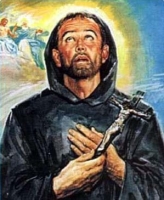
• Nicola da Longobardi
• Nicholas of the Longobards
Born to a poor peasant family, Giovanni was a clever boy who enjoyed study, but had to work the fields with his father instead of going to school. He was a pious child, and would spend whole days in prayer in a local Minim church. At 20, against his family's wishes (legend says that he was struck blind when his mother objected, and only recovered his sight when she agreed to let him follow his vocation), he became an Oblate friar of the Order of the Minims, taking the name Nicola. Miracle worker.
• 6 January 1650 in Longobardi, Cosenza, Italy as Giovanni Battista Clemente Saggio
• legend says that a light shown down on the house at the moment of his birth
• 2 February 1709 in Rome, Italy of natural causes
• he had previously predicted the date and time of his death
• 23 November 2014 by Pope Francis
• canonization celebrated in Saint Peter's Square, Vatican City, Rome, Italy
Longobardi, Italy
https://catholicsaints.info/saint-giovanni-battista-clemente-saggio/
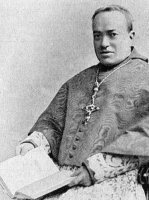
Andreas Ferrari
1 February (in Milan, Italy)
Educated in the seminary of Parma, Italy. Ordained on 20 December 1873 in Parma. Episcopal delegate of Mariano, February 1874. Coadjutor Bishop of Fornovo di Taro, Italy on 4 July 1874. Vice-rector of the Parma seminary, and professor of physics and mathematics in 1875. Rector of the seminary in 1877. Professor of fundamental theology, ecclesiastical history and moral theology in 1878. Bishop of Guastalla, Italy on 29 May 1890. Bishop of Como, Italy on 29 May 1891. Created cardinal on 18 May 1894. Archbishop of Milan, Italy on 21 May 1894. Chose his middle name of Carlo in honour of Saint Charles Borromeo. Participated in the conclave of 1903 that elected Pope Saint Pius X, and of 1914 that chose Pope Benedict XV.
13 August 1850 at Lalatta, Pratopiano, diocese of Parma, Italy
• 2 February 1921 at Milan, Italy of natural causes
• buried in the chapel Virgo Potens, cathedral of Milan
10 May 1987 by Pope John Paul II
1885: Summula theologiae dogmaticae generalis
https://catholicsaints.info/blessed-andrea-carlo-ferrari/
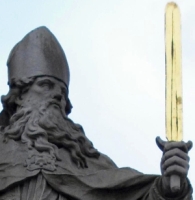
Burchardus, Burkard, Burkhard
14 October (translation of relics; Diocese of Würzburg, Germany)
Born wealthy, he felt early called to the Church and working with the poor. Inspired by Saint Boniface, he became a missionary in the area of modern Germany. First bishop of Würzburg, Franconia, consecrated by Saint Boniface in 741 and confirmed by Pope Saint Zachary in 743. Under his ministry all of Franconia converted, and several monasteries were founded by and for his people. Promoted devotion to Saint Killian who had previously worked in the region. A favourite of King Pepin the Short. Burchard led the party that sought Pope Zachary's decision on who should be the king of the Franks. Resigned his bishopric in 752, and spent the rest of his days in solitude and prayer.
in England
• 754 in Germany of natural causes
• buried at Mount Saint Mary or Old Würzburg
• relics transferred in 983 to the monastery of Saint Andrew in Würzburg, Germany
• the monastery has since been renamed in hounour of Burchard
Würzburg, Germany
https://catholicsaints.info/saint-burchard-of-wurzburg/
• Adalbald d'Ostrevant
• Adalbald of Douai
• Adalbaldus, Albold, Adelbald, Adalbade, Adalbaud
2 May (translation of relics to Douai, France)
Born to the nobility of Flanders, Belgium. Son of Saint Gertrude the Elder. Duke of Douai, France. Served in the courts of King Dagobert I and King Clovis II. While suppressing a rebellion in Gascony, he met and married Saint Rictrude of Marchiennes, daughter of Ernold. Though they were happy together, they fought constant opposition from her family who opposed his military incursion in their region. Father of Saint Maurontius of Douai, Saint Clotsindis of Marchiennes, Saint Eusebia of Hamage, and Saint Adalsindis. Adalbald and Rictrudis dedicated themselves and their fortunes to religious projects and care of the poor.
at Flanders, Belgium
• murdered c.651 by an in-law while on the road to Gascony
• listed as a martyr by many sources
• miracles reported at his tomb
• relics at Saint Amand les Eaux, Elanone and Douai, France
parents of large families
holding a church
https://catholicsaints.info/saint-adalbald-of-ostrevant/
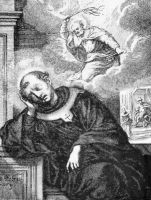
Benedictine monk. At the order of Pope Saint Gregory the Great, he accompanied Saint Augustine of Canterbury to evangelize England in 597. Upon Augustine's death, Lawrence became archbishop of Canterbury. When the Britons began to abandon Christianity and return to the old pagan customs, Lawrence planned to abandon them and return to France. However, he had a dream in which he was rebuked and scourged by Saint Peter the Apostle for giving up on his flock. Lawrence remained, redoubled his efforts at evangelization, and converted King Edbald who brought many of his subjects to the faith. Legend says that Lawrence carried physical scars from his dream beating by Saint Peter.
6th century
2 February 619 in Canterbury, England of natural causes
https://catholicsaints.info/saint-lawrence-of-canterbury/

• Simon Fidati
• Simon of Cascia
16 February (Augustinians)
Simon joined the Augustinian Hermits as a young man. Initially a student of the natual sciences and philosophy, as he grew older he became more and more drawn to religious matters, theology and Bible scholarship. Priest. Though he preferred solitude, prayer and study, and always avoided positions of authority, his preaching, writing and spiritual guidance led many to live more faithful and Christian lives.
c.1295 in Cascia, Italy
• 2 February 1348 in Florence, Tuscany, Italy during a plague epidemic
• relics enshrined in the church of Saint Augustine in Cascia, Italy
• relics enshrined in the crypt chapel in the Basilica of Saint Rita in Casia
1833 by Pope Gregory XVI
https://catholicsaints.info/blessed-simon-of-cassia-fidati/
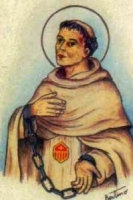
Born to the Italian nobility, part of the family of the counts of Montemarte. A well-educated and pious young man, he was a friend and travelling companion of Saint Peter Nolasco from whom he received the Mercedarian habit as a lay knight; Bernard joined the Order on 10 August 1218, the founding day of the Mercedarians. He was later ordained, and for a while was the only Mercedarian priest; he served as novice master for the Order as he was considered to be an excellent example. Sent to Algiers to ransom Christians who were being held by Moors, Father Bernard was imprisoned and enslaved for two years. Returning to Spain, he worked with Blessed Mary de Cerevellon, and helped her found the first female branch of the Mercedarians in 1265.
Corbara, Orvieto, Italy
• mid-13th-century Barcelona, Spain of natural causes
• interred in the Mercedarian church in Barcelona
• body reported to be incorrupt
https://catholicsaints.info/blessed-bernard-of-corbara/
Sunday following 2 February (United States)
Begun in 1997 by Pope John Paul II, the World Day for Consecrated Life was intended to serve three purposes
• to praise the Lord and thank him for the great gift of consecrated life
• to promote a knowledge of and esteem for the consecrated life by the entire People of God
• to allow those in consecrated life to celebrate together the marvels which the Lord has accomplished in them, to discover by a more illumined faith the rays of divine beauty spread by the Spirit in their way of life, and to acquire a more vivid consciousness of their irreplaceable mission in the Church and in the world
It serves an opportunity to highlight the extraordinary contributions of men and women religious as well as a time to pray for vocations to the consecrated life.
https://catholicsaints.info/world-day-for-consecrated-life/
Abbot of an Irish community. Following a series of Viking raids, he led his community to safer fields in Belgium. On 2 February 957 Columbanus became a hermit in the cemetery near the church of Saint Bavo, Ghent. He developed a wide reputation for holiness and attracted new followers. His name is in the litany to be recited in Belgium during public emergencies.
Ireland
• 15 February 959
• buried in the cathedral of Ghent, Belgium
https://catholicsaints.info/saint-columbanus-of-ghent/
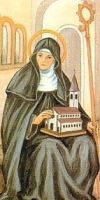
Adela, Adaloja, Hadeloga
Frankish princess. Benedictine nun. Founded the Benedictine convent of Kitzingen in Franconia (part of modern Germany), and served as its first abbess.
Frankish
c.745 of natural causes
https://catholicsaints.info/saint-adeloga-of-kitzingen/
Executioner for imperial Rome. He was a witness at the trial of Saint Sisinnius who was charged with Christianity in the persecutions of Diocletian. Sisinnius' statement of his faith converted Apronian. He was martyred soon after.
beheaded c.304 at Ancona, Italy
https://catholicsaints.info/saint-apronian-the-executioner/
Monk at New Corbey Abbey, Saxony (in modern Germany). Bishop of Hildesheim, Germany from 874. One of the Martyrs of Ebsdorf.
9th century
martyred in 880 in battle at Ebsdorf, Germany
https://catholicsaints.info/saint-marquard-of-hildesheim/
Bishop of Ninden, Germany. One of the Martyrs of Ebsdorf.
9th century
martyred in 880 in battle at Ebsdorf, Germany
https://catholicsaints.info/saint-theodoric-of-ninden/
After public announcing his Christianity, Agathodorus was tortured and martyred for his faith.
Tyana, Cappadocia (modern Nigde, Turkey)
https://catholicsaints.info/saint-agathodoros-of-tyana/
Duke. Leader of the army that became the Martyrs of Ebsdorf.
880 in battle at Ebsdorf, Germany
https://catholicsaints.info/saint-bruno-of-ebsdorf/
Floscolo, Flosculo, Flou
Bishop of Orleans, France.
480 of natural causes
https://catholicsaints.info/saint-flosculus-of-orleans/
Sicaire, Sigeria, Sicaria
Fifth century nun whose story has not survived.
https://catholicsaints.info/saint-sicharia-of-orleans/
Nun. Abbess at Archen. Martyred with several of her sisters.
982
https://catholicsaints.info/blessed-colomba-osorio/
There is a church named for her in Cornwall, England. No other information has survived.
may have been Irish
https://catholicsaints.info/saint-feock/
Fifth century bishop, ordained by his uncle Saint Patrick. Late in life he became a hermit on the island of Lough Ree, Ireland.
https://catholicsaints.info/saint-mun/
Addasta
Martyr.
https://catholicsaints.info/saint-abclasta/
Ebsdorf Martyrs
Members of the army of King Louis III of France under the leadership of Duke Saint Bruno of Ebsdorf. The martyrs died fighting invading pagan Norsemen, and defending the local Christian population. Four bishops, including Saint Marquard of Hildesheim and Saint Theodoric of Ninden, eleven nobles, and countless unnamed foot soldiers died repelling the invaders.
martyred in the winter of 880 in battle at Luneberg Heath and Ebsdorf, Saxony (modern Germany)
https://catholicsaints.info/martyrs-of-ebsdorf/
28 Christians who were martyred in Rome, Italy. No other information has survived, and we are not sure if they were martyred together, or just memorialized together. We know the names -
Bonosia • Cajus • Candidus • Cappa • Castula • Cornelianus • Felicianus • Felicitas • Felix • Firmus • Fortunatus • Gregorius • Hilarus • Ingenuus • Martialis • Mauritius • Mustula • Papyrius • Placidus • Rogatian • Rogatus • Salustius • Saturninus • Secundian • Secundula • Victoria (2 of) • Victor
c.212 in Rome, Italy
https://catholicsaints.info/martyrs-of-rome-2-february/
• Our Lady of Candelaria
• Our Lady of Good of Coromoto
• Our Lady of Good Success
• Santa María de Santa Anita
CatholicSaints.Info Portable Edition